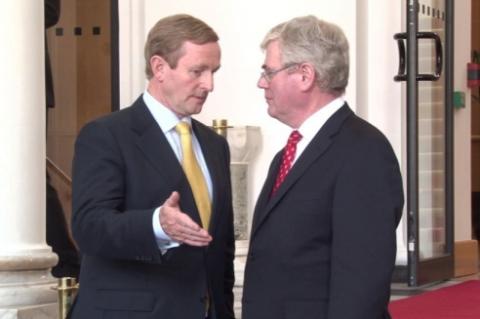No hope of government accountability in our screwed-up system

The inquiry system we have is like an accused person deciding which judge can hear their case and who the jury members should be. By Vincent Browne.
If Adrian Hardiman of the Supreme Court needed an illustration of the incapacity of Dáil Éireann to conduct a fair and independent inquiry into a matter of current controversy, he could not have wished for a more vivid example than the shemozzle over the holding of an inquiry into the banking crisis.
In the robust judgment he gave on why the Oireachtas should be debarred from conducting inquiries that could impugn the good name of individuals, he cited the partisan nature of politics which has marked the debate on the banking inquiry in recent days.
But, far worse than that, there is the consensus in politics and in the media that parliamentary inquiries need the permission of the very agency which, essentially, it should be seeking to hold accountable – the executive branch of government.
Our system of government is founded on the idea that the executive branch is held accountable by the parliament and that parliamentary inquiries are one of a range of instruments by which such accountability is enforced.
But in the bizarre, screwed-up system we have devised, the executive entirely controls the parliament to which it is accountable and therefore there is no accountability and can be no accountability.
There has been the amazing spectacle in the last week of the chairman of the most powerful of our Oireachtas committees, John McGuinness, referring to Minister for Public Expenditure and Reform Brendan Howlin as the minister to which the committee is “responsible”.
That was followed by Howlin saying he has not yet decided which of two committees should conduct an inquiry. This is Alice in Wonderland stuff and nobody seems to think there is anything at all odd about it.
Has nobody thought there was anything odd about McGuinness being appointed chairman of the Dáil public accounts committee, not by its members nor by the Dáil but by the two leaders of the executive branch of government, Enda Kenny and Eamon Gilmore – the very people Oireachtas committees are supposed to hold to account?
It is as though an accused person gets to decide which judge should hear his or her case, who the members of the jury are to be and what evidence is or is not allowed to be heard!
Anyway, an inquiry into what happened on the night of 29 September 2008, when the bank guarantee was decided upon, is fairly pointless by now.
It would be interesting, however, to hear why those who favoured the guarantee being urged by David McWilliams did not wonder whether it might be a disaster, since the same David McWilliams at the time had been saying for the previous several years there was going to be a property crash!
It would be interesting to hear McWilliams himself explain that.
What is needed is an inquiry into how the banks imploded; how they engaged in reckless lending fuelled by the property bubble; how government policy, aided and abetted by the opposition parties, fuelled that bubble (remember how Fine Gael and Labour wanted reductions in stamp duty in the 2007 election campaign, which would have inflated the property bubble even more?); what role the government and the State agencies played in the illegal share support operation for Anglo Irish Bank in the spring of 2008, and the role of the European Central Bank in insisting no bank should be allowed to fail.
Then the inquiry might extend into the unfolding of the bank crisis in 2009 and 2010, leading to the surrender to the International Monetary Fund and EU in November 2010, right up to how the present Government has attempted to implement its election promise to seek write-downs on the bank debt.
That’s what is needed but (a), will this happen? And (b), even if it were to happen, could such an Oireachtas inquiry be depended upon to conduct such an inquiry impartially, fairly and comprehensively?
The emphatic answer to both these questions is: no way.
It is precisely because of this that the Supreme Court quite properly decided the constitutional guarantee to the right to one’s good name could not be safeguarded in the context of an Oireachtas inquiry.
There is a way of remedying this but, again, one can be absolutely certain this will not happen. It would have to be inserted into the Constitution as a provision stipulating that it is an offence to interfere with the conscientious, independent vote of an Oireachtas member on any issue decided by the Oireachtas.
This is in the German constitution, and the German parliament seems to work rather well. So why not here? Because that would mean governments might be held accountable – and we can’t have that!
Another option would be the establishment of a tribunal (with no lawyer paid more than €650 a day) to conduct such an inquiry, with a deadline of two years and chaired by Peter Kelly, the judge heading the Commercial Court, or Frank Clarke, now on the Supreme Court, with full powers of compellability. But will that happen?
No way, yet again! {jathumbnailoff}
